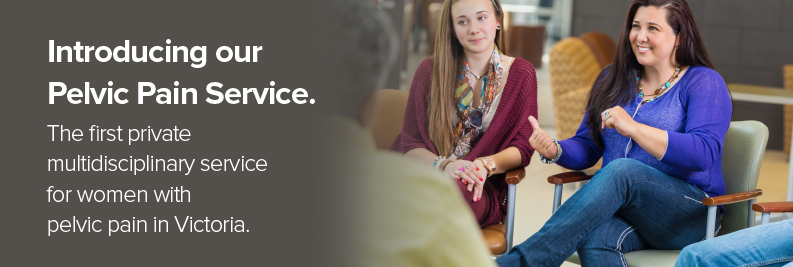Frances Perry House Pelvic Pain Service

The Frances Perry House Pelvic Pain Service has been developed to provide high quality care to women with pelvic pain from the first presentation, through assessment and treatment of the initial cause of the pain, to ongoing management of pelvic pain.
The Pelvic Pain Service is provided by a multidisciplinary team of specialists ensuring that women receive comprehensive and high-quality woman-centred care covering both physical and emotional wellbeing.
The multidisciplinary team consists of gynaecologists, a pain specialist, psychologist and physiotherapists. Each member of the team will perform a full assessment of your pain and develop an individual treatment plan aimed at helping to manage pelvic pain.
What is pelvic pain
Pelvic pain is pain experienced in the abdomen below the umbilicus (the region in the tummy below the belly button). When it occurs on most days for more than 6 months, it is called persistent pelvic pain.
What are some common causes of pelvic pain
Pelvic pain can be very complex with causes from many different organs.
Endometriosis
Endometriosis is a major cause and can occur in around 70% of women with pelvic pain. It is a gynaecological condition whereby the endometrium (lining of the womb) is abnormally deposited outside the womb, typically within the pelvis. Other possible causes include bladder pain syndrome or interstitial cystitis, pelvic mesh related pain and irritable bowel syndrome.
Pelvic Floor Muscle Dysfunction
Pelvic floor muscle dysfunction is also a significant cause of pelvic pain, although how common it is remains unclear. Muscles in the pelvic floor, hips and back can be tense and painful. That in itself can generate pain and can be the primary cause, or very commonly, as a result of having pelvic pain caused by other reasons (eg endometriosis) which can then contribute and add to the pain.
Nerve Sensitisation
Nerve sensitisation (when nerves become more efficient in sending pain signals) can develop in women experiencing pain for a long time or pre-existing in women with mental health issues or history of trauma/ abuse. When nerve sensitisation occurs, pain signals are amplified or altered, hence any pain generated is excessively strong and touch can become painful too. For example, period pain becomes intense even in the absence of pathology, or touch to the vulva is painful (vulvodynia) which can cause significant entrance pain with intercourse.
Mental Health
Mental health issues can cause or contribute to nerve sensitisation which in turn leads to worsening pelvic pain. Alternatively, women suffering from persistent pelvic pain can develop stress, depression and anxiety. Lack of sleep, stress and anxiety can activate the inflammation response and can worsen inflammatory conditions like endometriosis.
We support women who are experiencing:
Pelvic pain – including period pain, bladder pain and vulval pain.
Treatments for pelvic pain include:
Medical and conservative treatment
Hormones are often used to manage and stop periods and make endometriosis, if present, less active or inactive.
Simple pain killers and anti-inflammatories (eg. Panadol and Nurofen) can be used but strong opioid (morphine like) analgesia is not recommended for long term use as they can cause more problems (side effects, dependence, worsen pain) when used on a regular basis for a long time.
Neuromodulator or ‘nerve modifying’ medications can help reduce nerve pain.
Lifestyle measures such as dietary triggers and other irritants can be explored and addressed.
Physiotherapy management to optimise muscle function, such as relaxation, stretches and manual therapy, along with strategies to improve bladder, bowel and sexual function, aims to improve quality of life.
Psychological strategies and interventions to manage pain and the impact of pain on functioning.
Surgery and other interventions
Laparoscopy can both diagnose and treat endometriosis and other causes of pelvic pain (eg ovarian cysts, adhesions).
The pelvic floor muscles can be injected with botulinum toxin type A (Botox® or Dysport®) with local anaesthetics if they continue to be tense and painful despite conservative physiotherapy.
For bladder pain syndrome, a bladder instillation therapy can help to improve the pain. A short-term bladder distension under cystoscopic guidance may also help in some cases. Botulinum toxin injections into the bladder are usually reserved for patients who do not respond to the above measures.
Neuromodulation in the form of sacral nerve stimulation (SNS) or spinal cord stimulation (SCS) can be offered to patients with severe intractable pelvic pain. It is done in the operating theatre with sedation.
SNS/SCS will be considered in conjunction with multi-disciplinary care for suitable candidates.
Other gynaecology services available:
Through Gynaecare Victoria®, in rooms procedures such as insertion of IUD (eg Mirena®) and colposcopy (for abnormal cervical screening tests / pap smears) are offered. In addition, general gynaecological care, laparoscopic (key hole) surgery for other gynaecological issues (eg fibroids, menstrual disorders) and contraceptive advice are also available. Please visit www.gynaecarevic.com.au for more information.
Dr Chin Yong is a Urogynaecologist specialises in treating women with pelvic organ prolapse, urinary incontinence, voiding disorders and female pelvic pain. Please visit www.drchinyong.com.au.
How the service works
Your initial consult at the service is with a Gynaecologist, who will treat any gynaecological condition first. You will then be referred on for a multidisciplinary assessment and management with the other specialists within the team as necessary.
How to book an appointment
To visit the Frances Perry House Pelvic Pain Service, speak to your GP about a referral to:
Dr Claudia Cheng or Dr Charlotte Reddington through Gynaecare Victoria®.
GPs can download referral forms: PDF version, RTF version.
The Team
Gynaecare Victoria
Dr Claudia Cheng
Dr Claudia Cheng is an advanced laparoscopic surgeon and gynaecologist. She has special interest in treating women with pelvic pain and endometriosis. She understands pelvic pain is complex and requires a holistic approach with compassion and the use of both hormones and surgery, together with allied health involvement. Being an experienced level 6 laparoscopic surgeon, she routinely operates on patients with the most severe stage 4 endometriosis.
In practice for over ten years, Dr Claudia Cheng has published prolific research and operates within the endometriosis unit (Gynaecology 2) at the Royal Women’s Hospital. She is also a senior lecturer and examiner at the University of Melbourne, training supervisor for AGES (Australasian Gynaecological Endoscopy & Surgery Society), as well as an examiner and training supervisor with RANZCOG (Royal Australian and New Zealand College of Obstetricians and Gynaecologists).

Dr Charlotte Reddington
Dr Charlotte Reddington is a gynaecologist with interest areas in pelvic pain, endometriosis and advanced gynaecological surgery, having completed the Australasian Gynaecological Endoscopy and Surgery (AGES) Society accredited fellowship at the Royal Women’s Hospital (RWH). She understands the complicated issue of pelvic pain requires compassionate and holistic care, as well as expert surgical management when required.
Charlotte holds consultant (VMO) positions at both the Royal Women’s Hospital (Gynaecology 1 and 2 Units) and the Mercy Hospital for Women (Endosurgery A & B Units). She continues to run and partake in several clinical research trials in endometriosis and minimally invasive surgery and enjoys her role of researcher and teacher in addition to being a surgeon and clinician. Working across these major tertiary teaching hospitals, Charlotte offers comprehensive and up to date gynaecological care.
Pelvic Pain Service Co-ordinator
Caitlin DeLuca
Caitlin is the Nurse Unit Manager of the Maternity/Surgical Ward at Frances Perry House and the nursing co-ordinator of the Pelvic Pain Service.
Caitlin works closely with the multidisciplinary team to co-ordinate initial appointments and liaises with patients regarding the outcomes and recommendations from the multidisciplinary assessment.
Health 4 Women Physiotherapists
Jenny Pell & Kate Sindrey
Jenny and Kate are dedicated, caring and highly qualified pelvic floor physiotherapists who remain determined to ensure that every patient achieves the best outcome in the management and treatment of their pelvic pain.
Jenny and Kate use a variety of evidence-based techniques to address the musculoskeletal factors contributing to pelvic pain, as well as bladder and bowel dysfunction. As part of the multidisciplinary team, their aim is to empower each woman, and equip them with useful tools to manage their symptoms.
Both Jenny and Kate hold postgraduate qualifications in pelvic floor rehabilitation, and have worked in specialised multidisciplinary clinics in both the public and private sectors for over 10 years.
Pain Matrix Eastern
Dr Angela Chia
Dr Angela Chia is a Consultant Obstetrics Anaesthetist and Pain Specialist with over 10 years’ experience in improving pain management in women’s health.
Dr Chia is passionate about integrating interventional pain techniques into multidisciplinary pain management. Her particular interest in pelvic pain has led to major research projects and key teaching roles in Victoria. She is the immediate past President of Pelvic Pain Victoria; a not for profit organisation aiming at improving education to health care providers.
Dr Lori Shore Psychology
Dr Lori Shore
Lori is a highly experienced Clinical Psychologist with counselling and organisational endorsement with AHPRA. Using a range of evidence-based treatments she works collaboratively with clients who have gut and pelvic issues, continence and chronic pain. Over the past 10 years she has worked in private and public health sectors in multi-disciplinary teams in pain management, gut and continence clinics at Barwon Health, St Vincent’s Hospital and currently at Alfred Health. You can find out more about Lori on her website drlorishorepsychology.com.au.